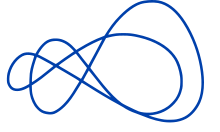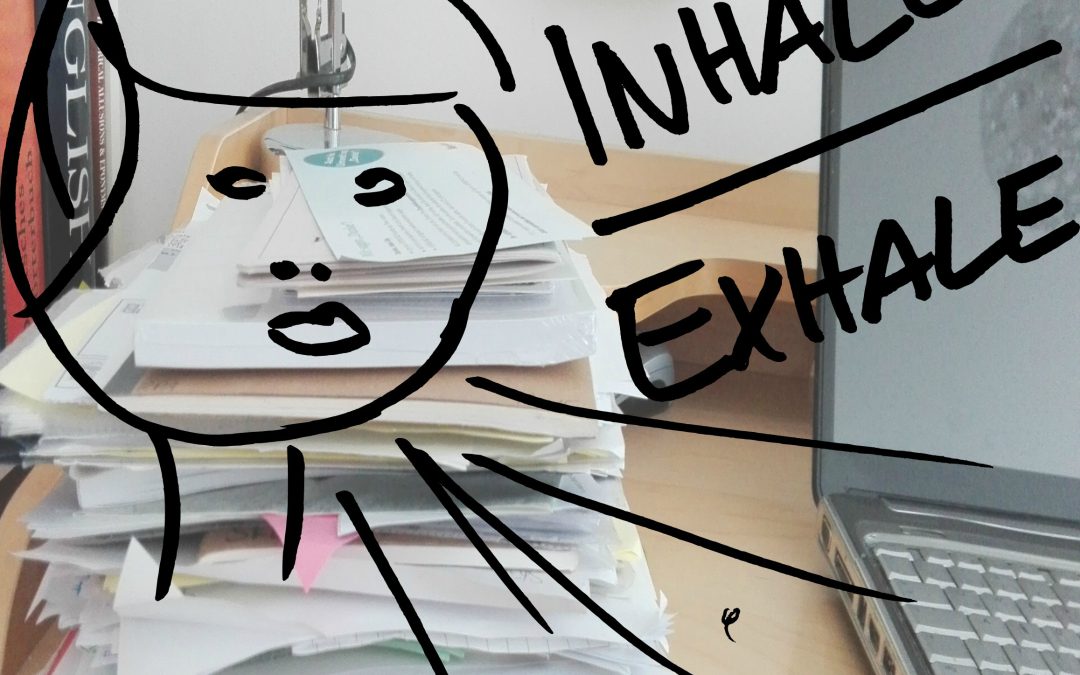Energy flows where
attention goes.
This universal saying is the basis of attention and awareness training. It sounds nice, but what does it mean in practical terms during a busy workday. And how can this serve you to reduce your stress level and get closer to your goals?
Let’s say you are stressed because of a meeting you need to head and you don’t know the people who will attend. You are nervous about the unknown situation so you want to be at your best. While you are sitting in front of the computer to prepare the presentation and devise the agenda, part of you is also busy not with the task at hand but with the situation you are preparing for that will happen 5 days from now. What you should wear, that you need to make sure you will be on time. Your thoughts wander, you get tense in the upper belly and maybe you lose your appetite. Because you’re afraid people will criticize your arguments, you are spending time preparing witty comebacks and convincing arguments. You realize you haven’t been very productive, so you get even more tense and you forget to breathe and relax, and your eyes are getting tired and you can’t think well any more.
Is this your reality? Do you know you suffer from a version of this stress response described above? If so, continue reading when we take apart what happened above with your energy and attention:
Where was your attention?
Your attention was split between the current task at hand, preparing the presentation and agenda, and being busy with a future event that makes you nervous. Part of your attention is directed at the work in the situation, part of your attention and energy is trapped in thoughts that won’t make your presentation better and you invest energy in a situation that may never happen. One way of mis-investing your energy is being busy in your mind with things that haven’t happened. You could have used the energy in typing without mistakes, thinking clearly, relaxing your neck and shoulders so you can go home after work without a reminder in the form of a stiff neck that you had a stressful day.
What did you do with your energy?
Your energy was trapped in physical tensions in your belly. Part of your energy was trapped with self-talk – the brain burns lots of calories. Make sure you use it to your advantage and not sabotaging yourself. Probably there were a few other places in the body that were tense – the eyes squinting and the neck tense.
So, why do you continue in this? It is obviously not efficient nor productive. It doesn’t reduce your anxiety to get through the meeting successfully. Actually, by behaving like above, you are
Because it’s normal. We have all got used to this kind of exhausting behavior. We see it all around us, it’s just how it is. I invite you to question this. I know it doesn’t have to be this way.
If you want to check how you are mis-investing your energy and want to change it, answer the following questions:
- What do you do when you are stressed?
- Do you try to work even faster? Or do you slow down?
- Are you avoiding the important tasks because they seem too daunting?
Once on paper, it becomes more real. It’s easier to remember the next time the situation happens you already know what to pay attention to and where you can regain energy and attention to achieve your goal.
What can you do to handle such stressful work situations with more ease?
- First, take a deep breath (or more) and feel your body. Your grey cells and thinking abilities as well as your motor skills for typing depend on your body having energy. Breathing is the fastest way of providing more energy to your body.
- Check what you are doing. (what is now) in terms of tasks and with your body.
Are you holding tensions? They also eat up energy that you could use for coming up with ideas for the presentation. If yes, let go as much as possible. (Training the ability to relax is something you can train specifically and also when you are not stressed so it becomes easier in the situation later.) Also check if what you are doing is actually getting you. Avoiding things that are important and scary is also an energy eater – because subconsciously you know you are avoiding it and it pushes your level of stress even further. You are losing valuable time to be productive. Stop doing what is not getting you closer to your goal. Relax your body as best you can. It might be a little scary or more exciting to get the difficult and important things done, but they also get you where you want.
- Focus on actions in the now, don’t get distracted – mono-tasking is the way.
Being busy in your mind is not an action. It is mostly unnecessary self-talk that doesn’t support you. If you catch yourself doing it (e.g. above the imaginary arguments to counter imagined, feared criticism), breathe and get back to what you planned to do. In real time, in real life. Not just the head. Life happens in reality, not the mind. Take actions that get you closer to your goal.
Do you have tricks how you handle stressful situations at work? How do you notice the level of stress has reached it’s limit and you become unproductive? And what is it that stresses you most? Deadlines, your colleagues, little office space, lack of air, worries about your kids… Share your experience and insights with us.
Follow Bodies at Work on Facebook to find out about current articles and upcoming events.


0 Comments